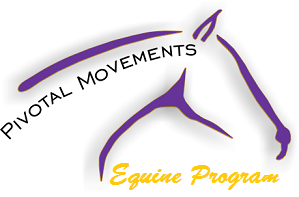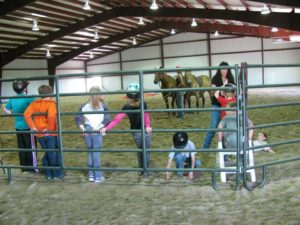 Why Horses and Why it Works
Why Horses and Why it Works
For thousands of years horses have been mystical, magical creatures playing the role of companion, transportation, gladiator, entertainer and now we are recognizing them as teachers. Horses can play the role as therapeutic and interactive tools that speed up the therapy process substantially. "One session in the barn is equal to five sessions on the couch." (Dr. Laurie Sullivan-Sakeada, Utah based Clinical Psychologist).
Horses and humans feel fear, anger, grief, relaxation, happiness, and affection. Their relationships share many of the same dynamics including trust, respect, boundaries, mutual support, affection and play.
Horses are prey animals, and like many people struggling with some type of stress or trauma, rely on their heightened senses for survival. They react and mirror emotions of people without saying a word. They respond negatively to negative emotion and positively to positive emotion. Equine assisted learning will provide an opportunity to learn self-discipline and the ability to manage emotions and responses. Anxiety and anger do not work with horses, and a person interacting with them will be required to manage their emotions to keep the horse from withdrawing.
Horses can be a place of support when we feel threatened. For clients facing life challenges, the soothing effect of stroking a horse can be very healing in itself. Experiential learning with a horse can achieve successes and by earning a horse's cooperation can increase a client's sense of empowerment and confidence. Learning to trust a horse and in turn earn the horse's trust can be a restoration of trust in something larger and more powerful than oneself. It is an awesome experience to realize that you are no longer without the power to keep yourself safe.
There are unending possibilities when including horses in emotional growth. The greatest benefit is that positive behaviors are not just taught, but experienced. The encounter promotes change and fosters growth. Clients are able to integrate the learning with what they have experienced. Some specific examples include:
- A boy with ADD/ADHD learns sequencing and planning of tasks and the ability to stay focused by grooming and preparing a horse to ride.
- A group of young men learn to cooperate and work together in a team-building exercise.
- A preteen improves her communication and social skills by playing games on horseback.
- A man learns to deal with the grief and disappointment of his divorce and the fear of raising his kids alone.
- A family tries to urge a horse over a jump without touching the horse, and learns about their roles and communication patterns within the family system.
- A timid girl learns assertiveness by directing a horse into and out of her space in a groundwork exercise.
- A group of young people look at a picture of a horse or meet the horse, hear the horse's story and discuss their interpretations and how it relates to them individually.
- A woman with anxiety learns the steps to take a horse over a scary object and relates that to breading down her own fears.
- A teen boy who tends to be oppositional learns about how he impacts others through trying to clean the hoof of a horse who will not cooperate.
- Children who have been abused can learn about boundaries and experience safe touch through grooming a horse.
Who can benefit?
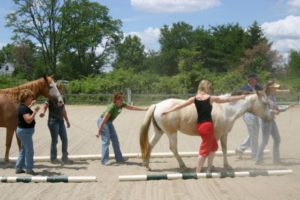 Clinical studies indicate that Equine Assisted Psychotherapy and Equine Assisted Learning can positively impact depression, anxiety, ADD/ADHD, grief/loss/divorce, abandonment, family of origin issues, and post traumatic stress resulting from physical or sexual abuse or combat-related trauma. Our services have proven beneficial for individuals facing these issues; those growing through a life or family transition – death, divorce, blending families, relocation – also benefit from our support. Many of our clients courageously face these issues within our program; an equal number choose to engage in our program simply for self-improvement and the joy of connection with our horses.
Clinical studies indicate that Equine Assisted Psychotherapy and Equine Assisted Learning can positively impact depression, anxiety, ADD/ADHD, grief/loss/divorce, abandonment, family of origin issues, and post traumatic stress resulting from physical or sexual abuse or combat-related trauma. Our services have proven beneficial for individuals facing these issues; those growing through a life or family transition – death, divorce, blending families, relocation – also benefit from our support. Many of our clients courageously face these issues within our program; an equal number choose to engage in our program simply for self-improvement and the joy of connection with our horses.
Our services benefit everyone from individuals with clinically diagnosed disorders to the people who have no diagnosable problem, but feel within themselves an interest in growth and change. Our programs are open to all children, adults and families who are interested in becoming happier, healthier, and more aware in their lives and relationships.
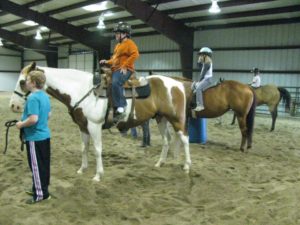 Equine Assistance addresses a variety of human developmental needs:
Equine Assistance addresses a variety of human developmental needs:
- Behavioral Issues
- Anxiety
- Depression
- Stress
- Relationship Problems
- Communication
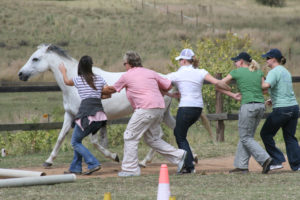 Equine Assistance will help:
Equine Assistance will help:
- Increase confidence and self-esteem
- Provide a safe and supportive environment in which to address challenges
- Relationship building with others
- Provide challenging, fun, and therapeutic healing
- Raise your awareness of the here and now in order to promote growth and change
- Develop boundaries
- Relationship building with yourself
- Discover resources and increase personal strength
- Discover balance in leadership
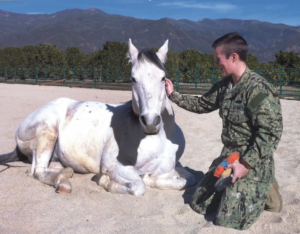 "There are so many stories I could share, being a Recreational Specialist for the VA, with regard to bringing WWII, Korean War and Vietnam Veterans to Equine Therapy with Cathy. In the beginning, staff and Veterans thought they were going to learn about horses. They ended up learning about themselves. All sessions were geared specifically for our Veterans, most of them being in wheelchairs. The experience drew them out, made them smile, and gave them something to take back with them. It would be an experience I would invest in again and again. We truly miss Pivotal Movements being a part of our weekly activity plan!" - Mary Haydal, Veterans Hospital (Miles City, MT)
"There are so many stories I could share, being a Recreational Specialist for the VA, with regard to bringing WWII, Korean War and Vietnam Veterans to Equine Therapy with Cathy. In the beginning, staff and Veterans thought they were going to learn about horses. They ended up learning about themselves. All sessions were geared specifically for our Veterans, most of them being in wheelchairs. The experience drew them out, made them smile, and gave them something to take back with them. It would be an experience I would invest in again and again. We truly miss Pivotal Movements being a part of our weekly activity plan!" - Mary Haydal, Veterans Hospital (Miles City, MT)
